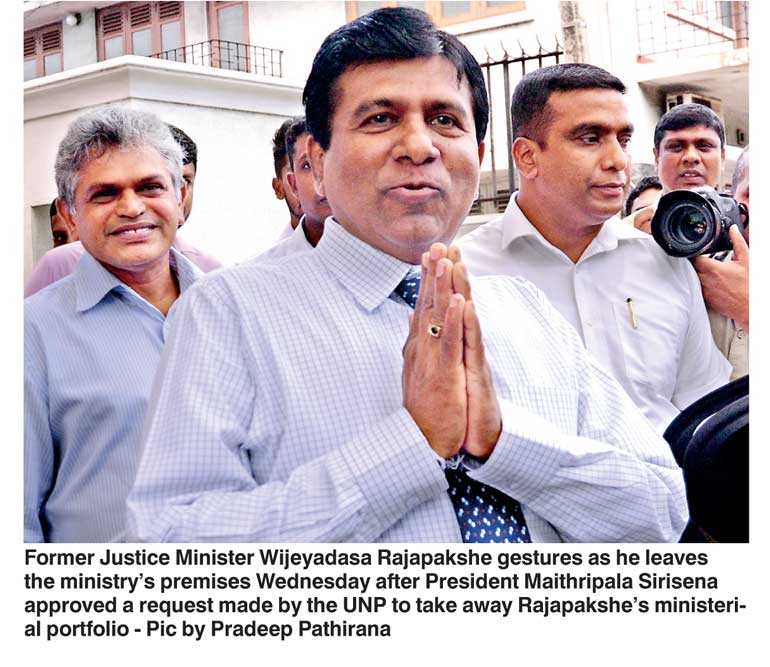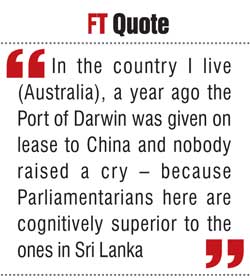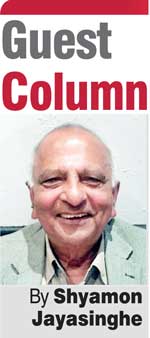Monday Feb 16, 2026
Monday Feb 16, 2026
Saturday, 26 August 2017 00:22 - - {{hitsCtrl.values.hits}}
 It is hard to find many examples in political exits at high levels that wear the bearings of being lame-legged, dull, and unexciting.
It is hard to find many examples in political exits at high levels that wear the bearings of being lame-legged, dull, and unexciting.
I have met this gentleman, Wijeyadasa Rajapakshe, while he was in Melbourne about two years ago and I have been impressed by his extraordinary clarity of mind, fluent word-flow, and relaxed delivery all of which bundled together made Wijeyadasa Rajapakshe (WR) a most agreeable political personality – rather rare among the whole lot of rotten guys in Parliament today.
WR had something of the class of the old brigade represented by Colvin R. De Silva, N.M. Perera, Leslie Gunawardena, etc. On the other hand, he lacked something crucial for integrity that those gentleman par excellence did possess.
What an anti-climax to roll out of the team charge! I can see some antecedents that led WR to take this hurried step. The Sarath Fonseka elevation and the Rajitha Senaratne annoyance had been among the uppermost in Wijeyadasa’s neocortex. However, a mature mind would know how to emotionally manage oneself against obstacles like that.

Politics is a long waiting game and only individuals who have the qualities of resilience can get on top of the situation. Ranil Wickremesinghe comes to my mind as just an illustration of that behavioural principle. It is sad that WR lacked that and that he succumbed to his hapless situation.
What an inglorious capitulation! Not in keeping with the high quality of this man. He said one thing and then said another that left his audience wondering whether WR was groping for excuses.
Hambantota issue
The Hambantota issue was the immediate cause. WR simply should have apologised on this instead of trying to defend himself with the poor brief. Having acceded to the Hambantota Cabinet decision, WR tried to back out urging it was a sell-out. He, clearly, becomes guilty of violating cabinet responsibility. There is no defence possible there.
Second, Hambantota was no “sell-out,” at all. It had been a lease and such leases are common strategies that governments all over the world do adopt given the failure of better options. In the country I live (Australia), a year ago the port of Darwin was given on lease to China and nobody raised a cry – because Parliamentarians here are cognitively superior to the ones in Sri Lanka.
Darwin was an economic strategy. Likewise, one can see that Hambantota was one such. First, how are we to payback the massive loan debt? WR sheds crocodile tears for the people but does he want the people to pay for these loans?
Second, China has a better prospect of managing the port profitably than we can ever have. China could manage that and the surrounding region and ensure significant trickle -down- flows in employment and income to the Hambantota people. WR says there isn’t a difference between a lease and a sell-out. There is, as the buyback of a lease is bound to be more cost-effective.
As a matter of legal fact, no property belonging to a country sold to a party of another country can ever represent an irrevocable sell-out for the simple reason that the country of location has the option of acquiring the block of land. The block may be sold but not the country and the block ultimately belongs to the country of its location.
Former Minister Wijeyadasa seems to be rejecting any idea of privatising land belonging to the Government and he deems such act as a “sell out of national assets”. This, again, isn’t so. Lee Kuan Yew privatised large blocks and gave them out for development to the private entrepreneurs and the latter did a marvellous job-bringing in enormous trickle effects to the economy of Singapore.
In Sri Lanka, we have large blocks of vacant and unused land belonging to the CGR and CTB. It is a wise policy to privatise them for suitable investment projects. WR says he stopped CTB land given once on this basis. Wasn’t that a foolish act?
Delay in finalising court cases
The unexplained and inordinate delay of finalising court cases of those of the previous regime suspected of theft, abuse, and murder had also been a sore point, especially among the UNP Working Committee and the population-at-large.
True, the Minister of Justice cannot be held fully responsible. On the other hand, WR never made one submission that explains the issues with regard to the delays – some of them obvious instances. The perception had been that WR acted as a barrier.
Avant-Garde
WR’s speeches in Parliament a year-or-so ago defending one accused, Gotabaya, and the Avant-Garde man, Senadhipathi, did not go down well. They were insensitive moves on his part. Pictures of WR and Senadhipathi enjoying each other’s private company went viral on social media. Wijeyadasa Rajapakshe should have been more sensitised and empathetic to such moves. He should have acted proactive. That is political skill.

Much has been reported about the positive side of Avant-Garde. The newly-appointed Navy Commander, Vice Admiral Sinnaiah, released some key information in an interview to a newspaper on Thursday, stating that Avant-Garde was originally a concept of the Sri Lanka Navy and he explained how the Navy ran that profitably while it was given away to the private company headed by Senadhipathi. Now, there you are: A ‘national asset,’ sold to a private firm!
The Navy Commander also points out how the decline in profits now after the re-takeover is due to the fact that some of the activities were separated out of the Navy. Said the Navy Commander: “The Avant-Garde operation is just a theory. This was a Naval operation and plan. You have to be very clear that Onboard Security Operations (OBS) was brought up by the Navy at the end of the war. After the war when the SL Navy went to various countries, especially the UN, they asked us whether we were capable of going out there and defeating the Somali pirates because we were the most robust small boat fighting team in the world. The SL Navy is ranked No. 1 as the most experienced and robust teams.”
However, the real slump of the former Minister’s defence came when he shifted from defence to attack mode by stating that his dismissal was done to cloak the “bond scandal”. The insinuation is that Ranil Wickremesinghe would also get caught. This ‘forecast’ of a case that is sub-juice isn’t right.
Furthermore, all we have up to now is the COPE investigation report and that exonerates the Prime Minister over this issue. COPE even states that had Mahendran followed the PM’s advice, this problem would not have arisen. Besides, on his own admission in his defence statement he had no authority over court investigations. How, then, could he have authority over the Presidential Commission?
(The writer can be reached via [email protected].)